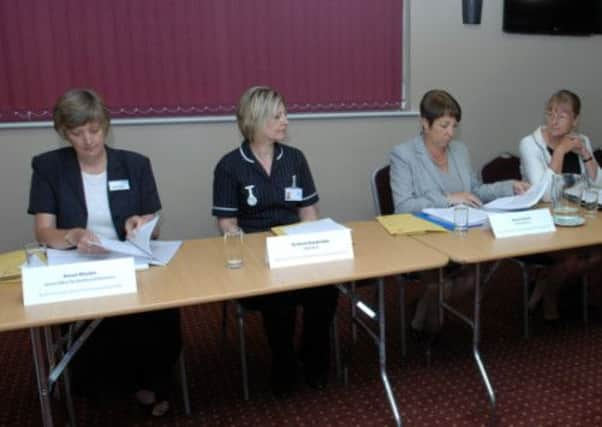Trust in special measures after litany of failings


Northern Lincolnshire and Goole Hospitals NHS Foundation Trust, which runs hospitals in Grimsby, Scunthorpe, and Goole, was one of 11 trusts put on a blacklist by Health Secretary Jeremy Hunt yesterday for “fundamental breaches of care”.
This followed yesterday’s publication of the Keogh Review into 14 NHS trusts with higher than expected mortality rates.
Advertisement
Hide AdAdvertisement
Hide AdThe trust was flagged as an “outlier” after recording higher than expected death rates in each of the last two years, having a Hospital Standardised Mortality Rate (HSMR) of 118 in 2012, and of 116 in 2011, when the expected average is 100.
Speaking at a Press conference at Glanford Park in Scunthorpe yesterday, trust chief executive Karen Jackson said: “This is not where our organisation or health and social care community aspires to be and we apologise entirely for any shortcomings in consistency of care.”
But she said there were “no examples of people dying unnecessarily”, and no patients were “being cared for inappropriately”.
This was at about the same time Mr Hunt was telling MPs of a patient at the trust being “inappropriately exposed” in front of male and female patients.
Advertisement
Hide AdAdvertisement
Hide AdThe incident concerned a man in a pre-surgery area at Diana, Princess of Wales Hospital in Grimsby, and was witnessed by inspectors during their Rapid Response Review. The panel found the trust was using interpretations of single-sex accommodation standards which are “no longer deemed acceptable”.
Other areas of concern highlighted in the report include:
Lack of basic care by staff in Grimsby, including lack of hydration, assistance with eating and inappropriate food
Patients being cared for by ambulance staff in A&E at Grimsby, on one occasion for more than an hour because they had been unable to complete the handover
Patients arriving at A&E in Scunthorpe waiting in the car park because A&E and the medical assessment unit (MAU) were full
Triage at Grimsby undertaken by a receptionist.
Advertisement
Hide AdAdvertisement
Hide AdRelatives also claimed patients had been put on a “Do Not Resuscitate” programme – the controversial Liverpool Care Pathway, which is to be phased out – without consulting their family, although the review found no evidence of this in patient notes.
A member of staff at Grimsby also reported patients being moved from accident and emergency onto the medical assessment unit to avoid a breach of the four-hour target for seeing patients in A&E, and gave an example of one patient who had not been monitored on the MAU for six hours and had “subsequently deteriorated”.
Overall, the panel said there appeared to have been “an initial reluctance to accept clinical responsibility for the mortality problem which has led to delays in improvement”. The report also suggested the trust had been more interested in balancing the books than providing quality of care.
It said: “Whilst there was some evidence of a shift from a financial to quality orientation, the Board needs to ensure a greater focus on the quality agenda throughout the organisation.”
Advertisement
Hide AdAdvertisement
Hide AdAsked how such a culture had been allowed to develop, Mrs Jackson said: “I think historically throughout the NHS, and I’m going back a significant number of years, one of the key drivers in terms of delivering a sustainable organisation was to make sure the finances were properly balanced and to a degree, for some of our organisations, that was extremely difficult.
“What we have been focusing on in the past three years is absolutely focusing on quality.”
Trust medical director Dr Liz Scott said of the review: “We very much welcome this report.
“The Keogh team have been fair in highlighting examples of good practice as well as improvements that need to be made.
Advertisement
Hide AdAdvertisement
Hide Ad“There is still more work to do but we are confident we will continue to bring our mortality ratios down further.”
Mrs Jackson added: “There are no surprises in the final report. It reinforces what we already know and are working on and reassures us that we are addressing the right issues.”